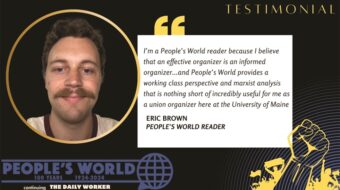
EMERYVILLE, Calif. — Some very persistent workers at the Woodfin Suites Hotel here are celebrating a crucial victory in their struggle to receive some $200,000 in back wages. The money is owed them under the terms of the city’s Measure C Living Wage ordinance.
On Jan. 15, at its fifth hearing on the matter in two months, the City Council upheld the back wage order the city manager issued last August, after hearing closing arguments by attorneys for the city and the hotel.
But with the Woodfin promising to take the matter to court, the workers are vowing to keep up the pressure.
The predominantly immigrant workers and their supporters, including members of SEIU and the hotel and restaurant workers union, the Interfaith Coalition for Worker Justice and others, rallied outside City Hall before the hearing, as they had before each previous session.
Guadelupe Martinez, among workers at the Cintas uniform and laundry company who won a long struggle for back wages, encouraged the Woodfin workers to stay strong. “Don’t lose heart,” she told them. “We fought for five years and after that there was a long wait.” There were times when the workers got tired and lost hope, Martinez said. “But if you stay together, you’ll win.”
Luz, a former Woodfin worker, told the World, “I teach my kids to be honorable and to respect people so people will also respect them. Our struggle shows my kids, no matter what race you are, don’t discriminate! And that when we stick together, we’ll win.”
In November 2005, voters here passed Measure C, a city living wage ordinance which also set standards for hotel housekeepers’ workloads, requiring payment of time-and-a-half when workloads exceed the limit. For most of the next year, the Woodfin assigned workloads greatly exceeding the limit. When workers stood up for their rights under the ordinance, the hotel responded with harassment and intimidation, including firing a dozen workers on the pretext of Social Security “no-match” letters. Community, faith and labor rights organizations demanded an end to the workers’ mistreatment and called on employers not to use immigration laws as a pretext to deny workers their right to uphold labor standards.
In August 2007 the City Council ordered the Woodfin to pay the back wages, and when Woodfin owner Samuel L. Hardage refused, the case went to court. Last spring an Alameda County Superior Court judge upheld the living wage law’s constitutionality, but ordered the city to re-do the process because of procedural concerns.
After last week’s final hearing, an attorney consulting with the city will write findings of fact based on the Council’s decision, which the body is expected to formally adopt at a coming meeting.
mbechtel @ pww.org











Comments